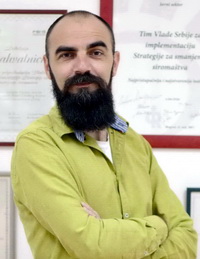 Written by: Aleksandar Bogdanović, European Affairs and International Cooperation Coordinator, Social Inclusion and Poverty Reduction Unit of the Government of the Republic of Serbia
Written by: Aleksandar Bogdanović, European Affairs and International Cooperation Coordinator, Social Inclusion and Poverty Reduction Unit of the Government of the Republic of Serbia
During early May all European Union institutions open their doors to interested citizens. The atmosphere of decision-making, followed by a plethora of information on the processes that shapes their lives, can be felt on location in Brussels, Strasbourg and Luxembourg. This is just one of the activities celebrating 9 May, Europe Day. The symbolism of this act is to show the connection between citizens and institutions. A specific element of this year’s celebration of Europe Day are the coming elections for the European Parliament that are an additional opportunity to feel the pulse of Europe and satisfaction with the work of the institutions.
The challenges faced by Europe, such as climate change, changes to the international order, the crisis of capitalism, Brexit, the fourth industrial revolution and changing nature of work have resulted, inter alia, in strengthening the social aspect of European integration. The economic segment of integration may have been emphasized since the very beginning, i.e. the nineteen-fifties, but the global economic crisis in 2008 clearly showed that further integration is impossible without an appropriate social, as well as cultural basis. The statement made in 2014 by Jean-Claude Juncker, the departing Chairman of the European Commission, should be interpreted in this sense, that the goal of his European Commission is a more just European Union with a AAA social ranking, referencing the most desirable status in financial rankings.
Five years later, at the dawn of elections for the European Parliament, certain results are visible. The European Pillar of Social Rights, as a sort of compass for European Union institutions, member states, and social partners, is the key legacy of the current composition of the European Commission in this field. This mechanism provides for the creation of better living and working conditions in Europe under new circumstances, as legislative initiatives and coordination solidify, complement or expand existing social rights in the European Union acquis.
Furthermore, investments into human capital, particularly through the processes of education, training and re-qualification, recognize the importance of the segment of poverty reduction and increasing social inclusion. In addition to the mechanism of Youth Guarantees receiving additional funds, it is worth noting the New Skills Agenda for Europe providing the cooperation framework towards strengthening human capital, employability and competitiveness, to harmonize the labour market supply and demand.
The process of Serbia’s accession to the European Union unfolds under different circumstances compared to the period of accession of Eastern and Central European countries. Global turbulence and European turmoil are also felt in Serbia, a country not left out of the trend of uncertainty and growing inequality. As stated in the Third National Report on Social Inclusion and Poverty Reduction in the Republic of Serbia 2014-2017, the Gini coefficient for measuring inequality is significantly higher than the EU 28 average, although the latest data from Eurostat for Serbia show a decrease in inequalities during the last two years that data is available for.
One wall of the offices of the Social Inclusion and Poverty Reduction Unit of the Government of the Republic of Serbia features Churchill’s message that an optimist sees the opportunity in every difficulty. In this regard, the situation described should be seen as an incentive for all stakeholders and competent institutions to invest further efforts into Serbia’s accession towards the EU. The Government of the Republic of Serbia has just published a report on the implementation of the Employment and Social Reform Programme (ESRP) to review the strategic progress, and to note the challenges and identify the lessons learned by Serbia in this process. Furthermore, efforts were made to comply with the measure, i.e. draft an Action Plan for Chapter 19, so that it would be opened soon. A lot has already been done, but many tasks remain for decision makers, institutions, social partners, local communities and other stakeholders.
Europe Day is an opportunity to note the achievements, but also open questions about the future of the European project. Peace, democracy and social welfare, despite their imperfections, represent the legacy of previous generations that have been building the European Union. The challenge for current generations is to preserve them, and for future ones to improve this unique concept of social organization to the benefit of all citizens living within the territory of Europe. The outcome of the elections for the European Parliament will trace the rhythm of changes for the next five years. Serbia has a role in this process, and thus it is important that all its resources are aimed in this direction.
(The text was originally published as the Introduction to the 56th Newsletter on Social Inclusion and Poverty Reduction.)
 Government of the Republic of Serbia
Government of the Republic of Serbia















 pdf [271 KB]
pdf [271 KB]
Leave a Comment